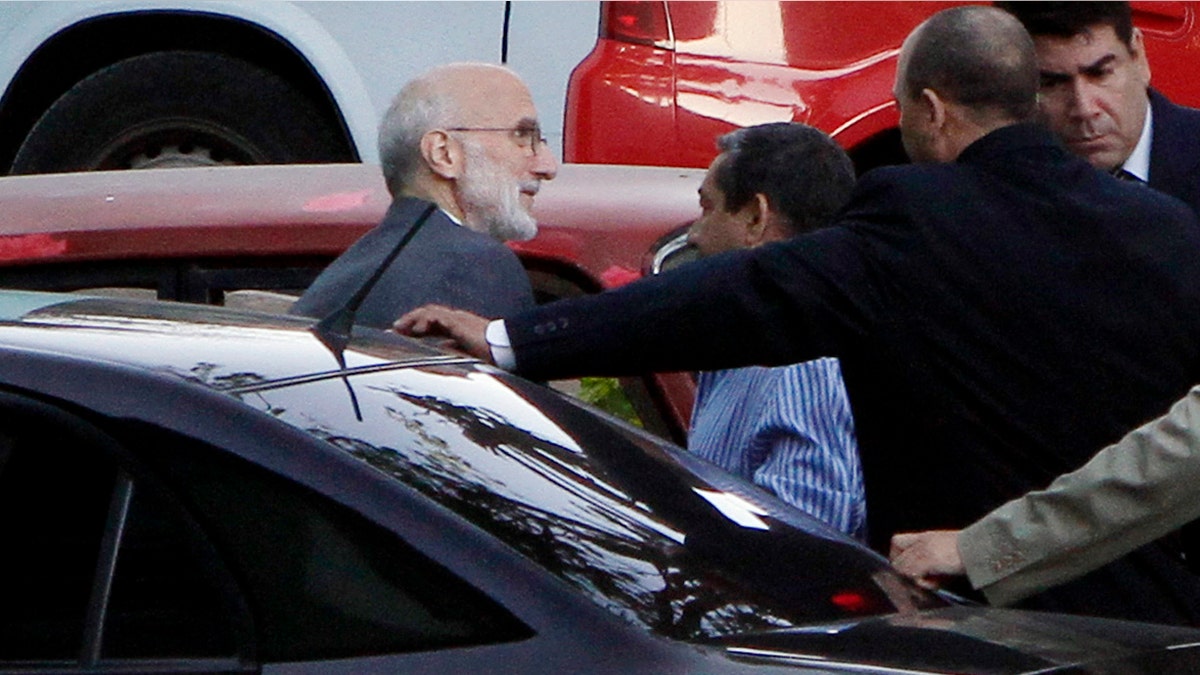Alan Gross' captivity: A timeline of events
{{#rendered}} {{/rendered}}
Alan Gross outside the courthouse in Havana, Cuba, in a March 5, 2011, file photo. (ap)
Alan Gross, the United States Agency for International Development subcontractor who was released Wednesday by the Cuban government was in jail in that country for five years. Here is a timeline of his capture and captivity:
Throughout 2009: Gross visits Cuba four times in the span of five months. He enters the country as a tourist doing “exceptional” bird watching, but he was actually smuggling computer and Internet equipment onto the island.
Dec. 3, 2009: Gross flies to Havana, following up with the community groups that he had given equipment to on previous visits. He is arrested at the airport.
{{#rendered}} {{/rendered}}Dec. 28, 2009: Gross is allowed contact with a U.S. representative—the consul general in Havana. He tells him that Cuban officials were treating him "with respect” but notes that his questioning had been “very intense.”
Jan. 2010: Gross is accused of being a U.S. spy by the Cuban government. The charges against him are later changed to “acts against the independence or the territorial integrity of the state.”
March 4, 2011: Gross’ trial begins in Havana. His wife, Judy, is in attendance.
{{#rendered}} {{/rendered}}March 12, 2011: Gross sentenced to 15 years in jail. The sentence is appealed by the American, and in August, the Supreme Court of Cuba affirms the decision.
Early 2012: Gross’ wife hires a public relations firm and on March 13 tells the website Politico that her husband is a "pawn" in a "failed policy" between the U.S. and Cuba. She asks the Obama administration to negotiate his release with the Castro administration.
May 2012: Questions arise about Gross’ health, including a lump on his right shoulder that family members worry may be cancer. He is diagnosed by doctors in Cuba as having a hematoma.
{{#rendered}} {{/rendered}}Nov. 2012: Gross and his wife sue USAID and the subcontractor he worked for directly for $60 million for not preparing and training him properly for his dangerous assignment. One year later, the lawsuit is settled without the terms being disclosed.
April 17, 2013: At a hearing of the House Committee on Foreign Affairs, Secretary of State John Kerry tells congressmembers, “[The Cubans] were, and have been, attempting to trade Alan Gross for the five spies that are in prison here in the United States. And we have refused to do that because there is no equivalency. Alan Gross is wrongly imprisoned. And we are not going to trade as if it is a spy for a spy, which they are trying to allege. We are trying to work this out on a humanitarian basis.”
April 8, 2014: Gross begins a hunger strike that lasts nine days. “I am fasting to object to mistruths, deceptions, and inaction by both governments, not only regarding their shared responsibility for my arbitrary detention, but also because of the lack of any reasonable or valid effort to resolve this shameful ordeal,” he said in a statement.
{{#rendered}} {{/rendered}}Nov. 12, 2014: Senators Jeff Flake and Tom Udall visit Gross in jail. Echoing comments by his family that the contractor has threatened to kill himself if not released, Flake says, “I do feel we're closer there, one because what Alan Gross has said himself, this is going to end one way or another."
The Associated Press contributed to this report.
Like us on Facebook
{{#rendered}} {{/rendered}}